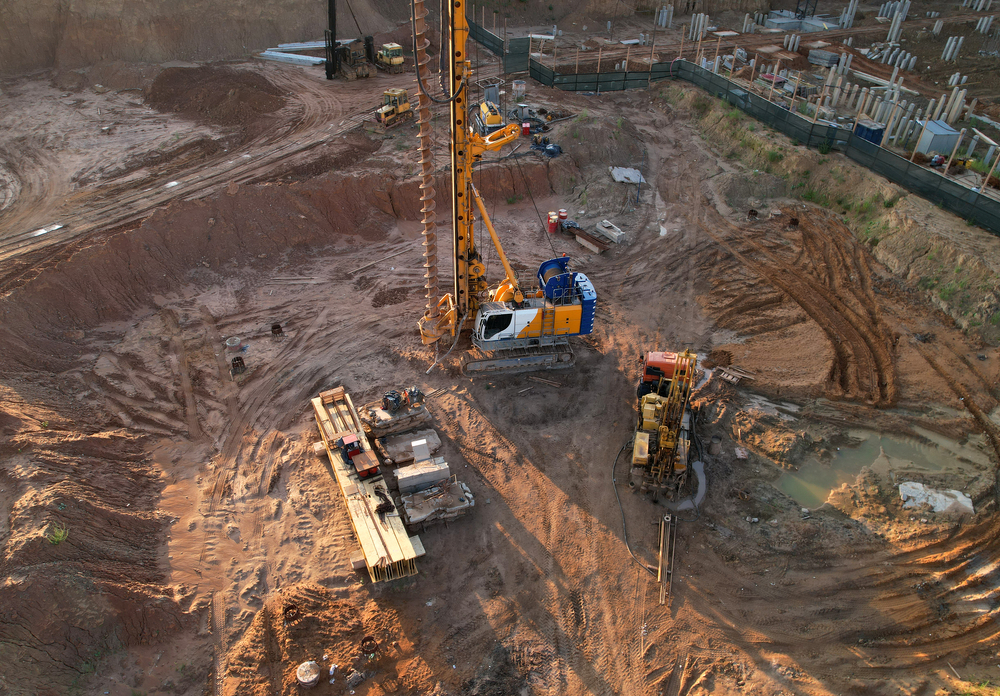A Biased View of Geotheta
Some Known Details About Geotheta
Table of ContentsWhat Does Geotheta Mean?Some Known Incorrect Statements About Geotheta A Biased View of GeothetaNot known Factual Statements About Geotheta Some Known Details About Geotheta

They carry out website examinations, accumulate samples, carry out laboratory tests, and assess information to assess the viability of the ground for construction projects - Geo Tech Engineer. Based upon their searchings for, geotechnical engineers give suggestions for structure layout, slope security, keeping frameworks, and reduction of geotechnical hazards. They collaborate with other experts, such as engineers, architectural designers, and construction teams, to guarantee that geotechnical factors to consider are incorporated right into the overall project design and implementation
By evaluating the habits and residential properties of dirt and rock, they can recognize potential geotechnical threats such as landslides, dirt settlement, or slope instability. Their know-how helps prevent failures or accidents that can jeopardize lives and home. Right here are some comprehensive duties and responsibilities of a geotechnical designer: Website Investigation: Geotechnical designers conduct website investigations to collect information on subsurface conditions.
They interpret the data to comprehend the properties and actions of the soil and rock, including their toughness, leaks in the structure, compaction characteristics, and groundwater problems. Geotechnical Evaluation and Layout: Geotechnical designers evaluate the information gathered throughout website examinations to examine the security and suitability of the site for building and construction jobs. They do geotechnical estimations and modeling to evaluate variables such as bearing capability, settlement, slope security, side earth pressures, and groundwater flow.
Facts About Geotheta Revealed
Structure Design: Geotechnical designers play an important function in creating foundations that can safely sustain the desired structure. They analyze the dirt conditions and load needs to establish the suitable foundation kind, such as superficial foundations (e.g., grounds), deep foundations (e.g (https://www.openstreetmap.org/user/geotheta)., stacks), or specialized techniques like dirt renovation. They think about factors such as negotiation restrictions, bearing capability, and soil-structure communication to establish ideal foundation layouts
They review construction plans, monitor site activities, and conduct area assessments to confirm that the design recommendations are followed. If unpredicted geotechnical problems develop, they assess the circumstance and provide referrals for remediation or changes to the style. Risk Assessment and Mitigation: Geotechnical engineers analyze geotechnical risks and threats connected with the project website, such as landslides, liquefaction, or soil erosion.

Collaboration and Interaction: Geotechnical engineers function carefully with various other experts associated with a job, such as architects, architectural engineers, and construction groups. Efficient communication and collaboration are important to incorporate geotechnical factors to consider into the total job design and building procedure. Geotechnical engineers provide technological knowledge, solution inquiries, and make certain that geotechnical demands are met.
Not known Details About Geotheta
Right here are some kinds of geotechnical engineers: Foundation Engineer: Foundation engineers specialize in creating and examining structures for frameworks. They analyze the dirt conditions, load demands, and site attributes to determine one of the most appropriate foundation type and style, such as shallow foundations, deep structures, or specialized strategies like pile foundations.
They examine the aspects influencing incline security, such as dirt properties, groundwater conditions, and slope geometry, and establish approaches to stop slope failures and reduce threats. Quake Designer: Quake designers focus on analyzing and designing structures to withstand seismic forces. They analyze the seismic hazard of a site, evaluate soil liquefaction capacity, and develop seismic style criteria to guarantee the security and durability of structures throughout earthquakes.
They perform area screening, gather samples, and evaluate the gathered information to identify the dirt residential properties, geologic formations, and groundwater conditions at a website. Geotechnical Instrumentation Designer: Geotechnical instrumentation designers concentrate that site on surveillance and determining the actions of dirt, rock, and structures. They install and keep instrumentation systems that keep an eye on aspects such as soil negotiation, groundwater degrees, incline movements, and architectural displacements to examine performance and offer very early cautions of prospective issues.
Our Geotheta PDFs
They conduct tests such as triaxial examinations, loan consolidation tests, straight shear examinations, and permeability tests to collect data for geotechnical evaluation and design. Geosynthetics Designer: Geosynthetics engineers focus on the layout and application of geosynthetic materials, such as geotextiles, geogrids, and geomembranes. They utilize these products to improve soil security, strengthen inclines, offer water drainage solutions, and control disintegration.
They have a tendency to be investigatory individuals, which indicates they're intellectual, introspective, and analytical. They wonder, systematic, logical, analytical, and rational. Several of them are likewise social, indicating they're kind, charitable, participating, patient, caring, practical, empathetic, skillful, and friendly. Does this noise like you? Take our cost-free career test to discover out if geotechnical engineer is one of your leading profession suits.
In the office environment, geotechnical engineers utilize specialized software tools to execute estimations, develop styles, and analyze data. They prepare records, review project specs, interact with clients and employee, and coordinate project tasks. The workplace setting supplies a conducive environment for study, evaluation, and partnership with various other specialists associated with the job.
Not known Details About Geotheta
They often see job websites to conduct website examinations, analyze geotechnical conditions, and gather information for analysis. These check outs include traveling to different areas, often in remote or difficult surfaces. Geotechnical engineers may execute dirt tasting, conduct tests, and screen construction activities to make sure that the geotechnical aspects of the task are being implemented appropriately.
Geotechnical designers also function in specialized geotechnical research laboratories. Geotechnical laboratory designers function thoroughly in these environments, dealing with screening equipment, operating instruments, and tape-recording data.